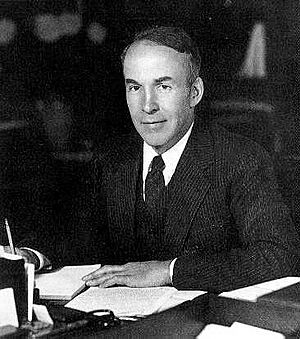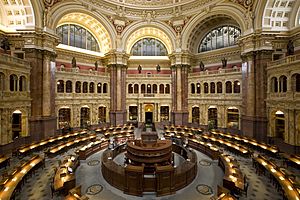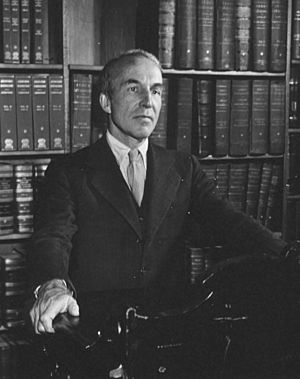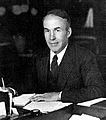Archibald MacLeish facts for kids
Quick facts for kids
Archibald MacLeish
|
|
|---|---|
 |
|
| 1st Assistant Secretary of State for Public Affairs | |
| In office December 20, 1944 – August 17, 1945 |
|
| President | Franklin D. Roosevelt Harry S. Truman |
| Preceded by | Position established |
| Succeeded by | William Benton |
| 9th Librarian of Congress | |
| In office July 10, 1939 – December 19, 1944 |
|
| President | Franklin D. Roosevelt |
| Preceded by | Herbert Putnam |
| Succeeded by | Luther H. Evans |
| Personal details | |
| Born | May 7, 1892 Glencoe, Illinois, US |
| Died | April 20, 1982 (aged 89) Boston, Massachusetts, US |
| Occupation |
|
| Known for | Poetry, drama, essays, librarianship |
| Writing career | |
| Genre | Poetry, drama, essays |
| Notable works | Panic, J.B. |
Archibald MacLeish (born May 7, 1892 – died April 20, 1982) was an American poet and writer. He was known for his modern style of poetry. He studied English at Yale University and law at Harvard University.
MacLeish fought in World War I and lived in Paris in the 1920s. Later, he wrote for Fortune magazine from 1929 to 1938. For five years, he served as the ninth Librarian of Congress, a job he took because President Franklin D. Roosevelt asked him to. From 1949 to 1962, he was a professor at Harvard. He won three Pulitzer Prizes for his work.
Contents
Early Life
Archibald MacLeish was born in Glencoe, Illinois. His father, Andrew MacLeish, was a merchant and helped start the department store Carson Pirie Scott. His mother, Martha, was a college professor and had been president of Rockford College.
He grew up near Lake Michigan. He went to the Hotchkiss School from 1907 to 1911. For college, MacLeish went to Yale University, where he studied English. He was chosen for the Skull and Bones society. Then he went to Harvard Law School and worked as an editor for the Harvard Law Review.
His studies were stopped by World War I. He first worked as an ambulance driver and then as an artillery officer. He fought in the Second Battle of the Marne. His brother, Kenneth MacLeish, died in the war. Archibald graduated from law school in 1919. He then worked briefly as an editor for The New Republic. After that, he practiced law for three years in Boston. He wrote about his feelings about the war in his poem Memorial Rain (1926).
Years in Paris and Public Service
In 1923, MacLeish left his law job and moved to Paris with his wife. They joined a group of American writers living there, like Gertrude Stein and Ernest Hemingway. They also spent time with famous hosts Gerald and Sarah Murphy on the French Riviera. This group included many other well-known artists and writers.
MacLeish returned to America in 1928. From 1930 to 1938, he worked as a writer and editor for Fortune magazine. During this time, he became more involved in politics, especially fighting against fascism. He believed that capitalism was "symbolically dead" and wrote a play called Panic (1935) about it.
While in Paris, Harry Crosby, a publisher, offered to publish MacLeish's poetry. Crosby published MacLeish's long poem "Einstein" in a special edition. In 1932, MacLeish published "Conquistador," a long poem about Cortés's conquest of the Aztecs. In 1933, "Conquistador" won a Pulitzer Prize. This was the first of three Pulitzer Prizes for MacLeish.
In 1934, he wrote the story for a ballet called Union Pacific [ru]. It was created by Nicolas Nabokov and Léonide Massine. The ballet premiered in Philadelphia and was very successful.
In 1938, MacLeish published "Land of the Free." This long poem was built around 88 photographs showing the rural depression. These photos were taken by famous photographers like Dorothea Lange and Walker Evans. The book influenced John Steinbeck when he wrote The Grapes of Wrath.
Librarian of Congress
American Libraries magazine has called MacLeish "one of the 100 most influential figures in librarianship during the 20th century." His work in libraries began when his friend, Felix Frankfurter, and President Franklin D. Roosevelt encouraged him. President Roosevelt nominated MacLeish for the job, which caused some debate.
Some people, especially Republicans, argued against MacLeish's nomination. They said he was just a poet and might be too sympathetic to communist ideas. MacLeish denied this, saying "no one would be more shocked to learn I am a Communist than the Communists themselves." With President Roosevelt's support, MacLeish was approved by the United States Senate. He was sworn in as Librarian of Congress on July 10, 1939.
MacLeish learned that the library needed many changes. The previous Librarian, Herbert Putnam, wanted to keep working there. This made MacLeish feel like he would be "an unpopular newcomer, disturbing the status quo."

MacLeish realized he needed to define his new job. He started by holding daily meetings with the library's leaders. He also set up committees to look at different parts of the library, like how books were bought and organized. These committees helped him find problems.
One big problem was that the library was getting more books than it could catalog. In 1939, over a quarter of the library's books had not been cataloged. MacLeish formed a committee to get advice from experts outside the library. They found that some areas of the library's collection were strong, but many others were not. New rules were made to make sure the library collected important materials. This included materials for Congress, records of American life, and important works from other cultures.
Next, MacLeish reorganized how the library worked. He divided the library's jobs into three main departments: administration, processing, and reference. All existing parts of the library were then placed into these new departments. Within a year, MacLeish had completely changed the Library of Congress, making it much more efficient.
Finally, MacLeish worked to promote the Library of Congress to the public. He asked Congress for a large budget increase in March 1940. While he didn't get the full amount, the library received the biggest one-year increase it had ever seen. This money helped improve pay, buy more books, and create new jobs. MacLeish left his role as Librarian of Congress on December 19, 1944. He then became the Assistant Secretary of State for Public Affairs.
World War II and Public Service
During World War II, Archibald MacLeish helped create the "Research and Analysis Branch" for the Office of Strategic Services. This group was a early version of the Central Intelligence Agency. They hired many experts from universities to gather information.
MacLeish also served as director of the War Department's Office of Facts and Figures. He was also an assistant director of the Office of War Information. These jobs involved creating information for the public, which fit MacLeish's skills. He had written many politically focused works before. He spent a year as the Assistant Secretary of State for Public Affairs. He also represented the U.S. when UNESCO was created. He helped write the famous line in its Constitution: "Since wars begin in the minds of men, it is in the minds of men that the defenses of peace must be constructed." After this, he left public service and went back to teaching.
Return to Writing and Legacy
In 1949, MacLeish became a professor at Harvard University. He held this job until he retired in 1962. In 1959, his play J.B. won the Pulitzer Prize for Drama. From 1963 to 1967, he was a lecturer at Amherst College.
MacLeish admired poets like T. S. Eliot and Ezra Pound. His early work showed their influence. He played an important role in helping Ezra Pound leave the hospital where he was held. MacLeish's most famous poem, "Ars Poetica," says: "A poem should not mean / But be." This meant a poem should just exist, not try to teach a lesson. However, MacLeish later changed his mind. He became very involved in public life and believed that poets should be part of society.
In 1969, the New York Times asked MacLeish to write a poem to celebrate the Apollo 11 moon landing. He called it "Voyage to the Moon." It appeared on the front page of the newspaper on July 21, 1969.
MacLeish worked hard to support the arts, culture, and libraries. He was the first Librarian of Congress to start the process of naming what would become the United States Poet Laureate. This position came from a donation in 1937. MacLeish wanted the position to rotate among different poets, not be a job for life. In 1943, he appointed Louise Bogan to the position, even though she had criticized his writing. He believed she was the best person for the job. For MacLeish, promoting the Library of Congress and the arts was more important than personal disagreements.
In 1972, MacLeish wrote an essay about his ideas on libraries. He said that every true book is like a "report" on the "mystery of existence." He believed that libraries are special because they bring all these different reports together. He said that libraries help us understand the world and ourselves. He felt that libraries stand strong even when other parts of civilization might struggle.
Two collections of MacLeish's papers are kept at the Yale University Beinecke Rare Book and Manuscript Library. More than 13,500 items from his papers are also held at Greenfield Community College in Massachusetts.
Personal Life
In 1916, Archibald MacLeish married Ada Hitchcock, who was a musician. They had three children: Kenneth, Mary Hillard, and William. William later wrote a book about his father called Uphill with Archie (2001).
Awards and Honors
- 1933: Pulitzer Prize for poetry (Conquistador )
- 1946: Commandeur de la Legion d'honneur (a French honor)
- 1950: Elected to the American Academy of Arts and Sciences
- 1953: Pulitzer Prize for poetry (Collected Poems 1917–1952)
- 1953: National Book Award for Poetry (Collected Poems, 1917–1952)
- 1953: Bollingen Prize in Poetry
- 1959: Pulitzer Prize for Drama (J.B.)
- 1959: Tony Award for Best Play (J.B.)
- 1976: Elected to the American Philosophical Society
- 1977: Presidential Medal of Freedom
Works
Poetry collections
- Class Poem (1915)
- Songs for a Summer's Day (1915)
- Tower of Ivory (1917)
- The Happy Marriage (1924)
- The Pot of Earth (1925)
- Nobodaddy (1926)
- Streets in the Moon (1926)
- The Hamlet of A. Macleish (1928)
- Einstein (1929)
- New Found Land (1930)
- Conquistador (1932)
- Elpenor (1933)
- Frescoes for Mr. Rockefeller's City (1933)
- Poems, 1924–1933 (1935)
- Public Speech (1936)
- The Land of the Free (1938)
- Actfive and Other Poems (1948)
- Collected Poems (1952)
- Songs for Eve (1954)
- The Collected Poems of Archibald MacLeish (1962)
- The Wild Old Wicked Man and Other Poems (1968)
- The Human Season, Selected Poems 1926–1972 (1972)
- New and Collected Poems, 1917–1976 (1976)
Prose
- Jews in America (1936)
- America Was Promises (1939)
- The Irresponsibles: A Declaration (1940)
- The American Cause (1941)
- A Time to Speak (1941)
- American Opinion and the War: the Rede Lecture (1942)
- A Time to Act: Selected Addresses (1943)
- Freedom Is the Right to Choose (1951)
- Art Education and the Creative Process (1954)
- Poetry and Experience (1961)
- The Dialogues of Archibald MacLeish and Mark Van Doren (1964)
- The Eleanor Roosevelt Story (1965)
- A Continuing Journey (1968)
- Champion of a Cause: Essays and Addresses on Librarianship (1971)
- Poetry and Opinion: the Pisan Cantos of Ezra Pound (1974)
- Riders on the Earth: Essays & Recollections (1978)
- Letters of Archibald MacLeish, 1907–1982 (1983)
Drama
- Union Pacific (ballet) (1934)
- Panic (1935)
- The Fall of the City (1937)
- Air Raid: A Verse Play for Radio (1938)
- Colloquy for the States (1943)
- The American Story: Ten Broadcasts (1944)
- The Trojan Horse (1952)
- This Music Crept By Me on the Waters (1953)
- J.B. (1958)
- Three Short Plays: The Secret of Freedom. Air Raid. The Fall of the City. (1961)
- An Evening's Journey to Conway (1967)
- Herakles (1967)
- Scratch (1971)
- Magic Prison: the Poetry of Emily Dickinson (1975)
- The Great American Fourth of July Parade (1975)
- Six Plays (1980)
See Also
 In Spanish: Archibald MacLeish para niños
In Spanish: Archibald MacLeish para niños
- List of ambulance drivers during World War I
Images for kids
 | Kyle Baker |
 | Joseph Yoakum |
 | Laura Wheeler Waring |
 | Henry Ossawa Tanner |





